Giant Isopod

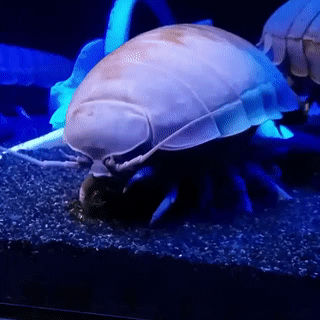
Giant Isopod
Bathynomus kensleyi
The Giant Isopod is an unsettling deep sea creature that crawls along the ocean floor scavenging for animal remains and detritus. These invertebrates are part of phenomenon known as abyssal gigantism, which is the tendency for deep-sea dwelling invertebrates to be larger than their shallower-water counter parts. The Giant Isopod is found between 310m to 2140m in the ocean.
Photo credit
https://seatrench.tumblr.com/post/615873390014791680/giant-isopod-bathynomus-sp-source
https://alchetron.com/Giant-isopod
More Posts from Bioluminescentoceangoddess and Others
An amazing glowing ctenophore!
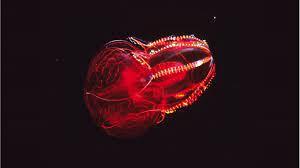

Bloody-belly comb jelly
Lampocteis cruentiventer
The Bloody-belly is a 16 cm ctenophore that is found at depths 700 m to 1200m. It is crimson red in color and appears black in the deep ocean. However, the jelly has the ability to emit a different color. Furthermore, it uses highly iridescent ctenes to propel through the water.
Photo credit: https://laughingsquid.com/bloody-belly-comb-jelly/
https://www.reddit.com/r/deepseacreatures/comments/2j1717/bloodbelly_comb_jelly_lampocteis_cruentiventer/


Atolla Jelly
Atolla wyvillei
The Atolla Jelly is a fiery, red jellyfish that has an extraordinary display of bioluminescence. When the jelly is attacked, it uses bioluminescence to produce thousands of vibrant, blue flashes; the blue flashes act as an alarm, which draws in bigger predators and warns prey. The jelly can be found at depths between 600 m to 1500m, and it also has a long hypertrophied tentacle that aids in reproduction.
Photo credit: https://en.wikipedia.org/wiki/Atolla_jellyfish
https://en.wikipedia.org/wiki/Atolla_jellyfish


Glowing sucker octopus
Stauroteuthis syrtensis
The Glowing Sucker Octopus can be found at 2500 m in the deep ocean. This unique creature has two fins that look similar to elephant ears. They move elegantly through the water by moving these fins and contracting their mantle. Evidence of this creature has only been spotted in the Atlantic Ocean.
Photo credit: https://octolab.tv/species/glowing-sucker-octopus/
https://ferrebeekeeper.wordpress.com/2011/03/14/glowing-sucker-octopus/
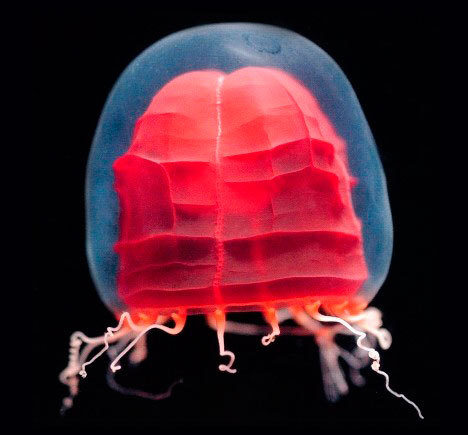

Red Paper Lantern Medusa
Pandea rubra
The Red Paper Lantern resembles a floating, Japanese paper lantern in the deep sea. It has the ability to crumple and wrinkle its bright, red bell, and it is located at depths between 550m to 1200m. It has also been nicknamed the “origami jelly.”
Photo credit: https://commons.wikimedia.org/wiki/Category:Pandea_rubra
http://www.thegorgeousdaily.com/pandea-rubra/


Wolftrap Angler
Thaumatichthys binghami
The Wolftrap Angler is slightly different from many other species of anglers. It has its bioluminescent lure located inside of its mouth instead of connected to its body. Even though it is intimidating up close, it is only nine centimeters in size. It is found in the deep ocean at 2432m.
Photo credit
https://en.wikipedia.org/wiki/Thaumatichthys_binghami
https://igniteyourcuriosity.wordpress.com/2016/10/22/anglerfish/

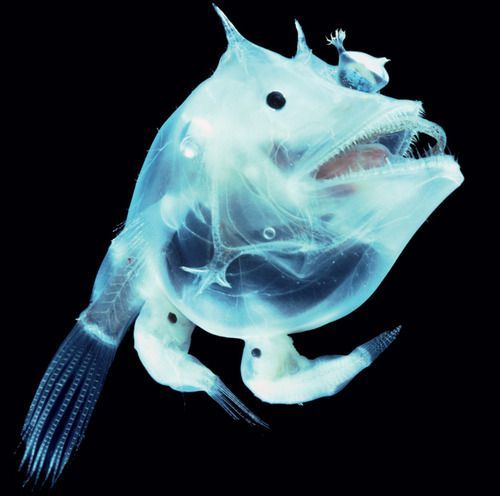
Deep-sea white anglerfish
Haplophryne mollis
The Deep-sea white anglerfish is a ghostly white creature found at depths between 1000m to 4000m. The strange bulge between its eyes is a bioluminescent lure. The main fish above is a female and the tiny fish attached to her body are males. Since it is difficult to find mates in the deep ocean, male fish latch onto the female with hooked teeth. Even though the male fish are parasitic, they are eventually reduced to pockets of sperm that are used for reproduction. For all you fellas out there that have a rough time with the ladies, be thankful that you are at least not a bag of gonads floating through the ocean.
Photo credit: https://www.pinterest.co.uk/pin/440297301041956897/
https://news.cgtn.com/news/3d3d414d3559444f7a457a6333566d54/share_p.html


Helmet Jelly
Periphylla periphylla
The Helmet Jelly can be found at all depths of the ocean. This vibrant and strange jellyfish tends to proliferate in Norwegian fjords. They are one of the dominant predators in these isolated ecosystems.
Photos
http://www.seawater.no/fauna/cnidaria/periphylla.html
https://www.bigfishexpeditions.com/2019/01/24/norway-deepwater-shark-diving-2018/helmet-jelly/



Fangtooth
Anoplogaster cornuta
The Fangtooth is a ferocious predator that is found at depths between 600 m to 5000 m. It has large, needle like teeth that are used to catch prey. It also has extremely sensitive sensory canals underneath of its scales used to detect movement in the water. Furthermore, their preferred prey are crustaceans and fish.
Photo credit: https://pixels.com/featured/fangtooth-fish-dant-fenolio.html
https://www.pinterest.com/pin/845902742487789950/
https://www.newscientist.com/article/mg23231020-400-up-close-with-the-giant-teeth-of-the-deepsea-fangtooth/

Black- eyed squid
Gonatus onyx
The Black-eyed Squid is roughly over one foot (35 am) and is found at depths as deep as 2500m. The female Black-eyed Squid works fiercely to protect her babies, by carrying around a patch of egg for six to nine months. When the eggs hatch, 2000 to 3000 babies are released into the ocean. However, this makes her vulnerable to predators.
Photocredit: http://tolweb.org/Gonatus+onyx/19769


Pink Helmet
Aglantha digitale
The Pink Helmet is a mini hydromedusa that comes in a variety of vibrant colors. The tiny jelly is only 4 cm in size and is found towards the surface of the ocean. The purple and blue hues we see in its bell are caused by a phenomenon known as iridescence, when light strikes the jelly’s thin tissue at different angles (similar to what we see in a soap bubbles). It also has orange pigmentation near its mouth; this pigmentation helps attract prey and mask luminescence. Furthermore, females tend to be more colorful than males.
Photo credit: https://biolum.eemb.ucsb.edu/organism/pictures/aglantha.html
https://www.pinterest.com/pin/186899453255850798/
-
 poolofblissfulmisery liked this · 5 months ago
poolofblissfulmisery liked this · 5 months ago -
 ali-inwonder liked this · 5 months ago
ali-inwonder liked this · 5 months ago -
 floxy-offical reblogged this · 5 months ago
floxy-offical reblogged this · 5 months ago -
 floxy-offical liked this · 5 months ago
floxy-offical liked this · 5 months ago -
 lichengender liked this · 8 months ago
lichengender liked this · 8 months ago -
 faultyconnection-error2981046 liked this · 8 months ago
faultyconnection-error2981046 liked this · 8 months ago -
 skostsyy reblogged this · 11 months ago
skostsyy reblogged this · 11 months ago -
 dreamoftheotherlife liked this · 1 year ago
dreamoftheotherlife liked this · 1 year ago -
 pvppy-paw liked this · 1 year ago
pvppy-paw liked this · 1 year ago -
 kindnessinmonsters reblogged this · 1 year ago
kindnessinmonsters reblogged this · 1 year ago -
 praxisgalore reblogged this · 1 year ago
praxisgalore reblogged this · 1 year ago -
 caranthira reblogged this · 1 year ago
caranthira reblogged this · 1 year ago -
 sweetcreatortimetravel reblogged this · 1 year ago
sweetcreatortimetravel reblogged this · 1 year ago -
 sweetcreatortimetravel liked this · 1 year ago
sweetcreatortimetravel liked this · 1 year ago -
 malotovmonk liked this · 1 year ago
malotovmonk liked this · 1 year ago -
 absolutesciencefiction reblogged this · 1 year ago
absolutesciencefiction reblogged this · 1 year ago -
 laxsland liked this · 1 year ago
laxsland liked this · 1 year ago -
 jadegrimm reblogged this · 1 year ago
jadegrimm reblogged this · 1 year ago -
 jadegrimm liked this · 1 year ago
jadegrimm liked this · 1 year ago -
 androidsghost liked this · 1 year ago
androidsghost liked this · 1 year ago -
 caranthira reblogged this · 1 year ago
caranthira reblogged this · 1 year ago -
 isofluresence liked this · 1 year ago
isofluresence liked this · 1 year ago -
 rac99n reblogged this · 1 year ago
rac99n reblogged this · 1 year ago -
 thisiscooliguessh liked this · 1 year ago
thisiscooliguessh liked this · 1 year ago -
 smutneczwartki liked this · 1 year ago
smutneczwartki liked this · 1 year ago -
 nekoisopods reblogged this · 1 year ago
nekoisopods reblogged this · 1 year ago -
 nekoisopods liked this · 1 year ago
nekoisopods liked this · 1 year ago -
 crabait liked this · 1 year ago
crabait liked this · 1 year ago -
 hornedviper6 liked this · 1 year ago
hornedviper6 liked this · 1 year ago -
 stardustandmoonflowers liked this · 1 year ago
stardustandmoonflowers liked this · 1 year ago -
 starconch-e liked this · 1 year ago
starconch-e liked this · 1 year ago -
 movedd liked this · 1 year ago
movedd liked this · 1 year ago -
 cynical-soup reblogged this · 1 year ago
cynical-soup reblogged this · 1 year ago -
 lemon-lime-lauren reblogged this · 1 year ago
lemon-lime-lauren reblogged this · 1 year ago -
 dragoonmagic liked this · 1 year ago
dragoonmagic liked this · 1 year ago -
 bewrabawa reblogged this · 1 year ago
bewrabawa reblogged this · 1 year ago -
 merpdaberp liked this · 1 year ago
merpdaberp liked this · 1 year ago -
 rosyanchoress liked this · 2 years ago
rosyanchoress liked this · 2 years ago -
 salpman liked this · 2 years ago
salpman liked this · 2 years ago -
 thevoiceofmadness liked this · 2 years ago
thevoiceofmadness liked this · 2 years ago -
 octowrld reblogged this · 2 years ago
octowrld reblogged this · 2 years ago -
 octowrld liked this · 2 years ago
octowrld liked this · 2 years ago -
 sweetstove liked this · 2 years ago
sweetstove liked this · 2 years ago -
 astrosomething liked this · 2 years ago
astrosomething liked this · 2 years ago
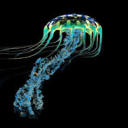
Bioluminescence is a chemical reaction that produces light. Many deep sea animals use bioluminescence. This blog is dedicated to educating the public about the amazing creatures that thrive in the deep sea.
57 posts